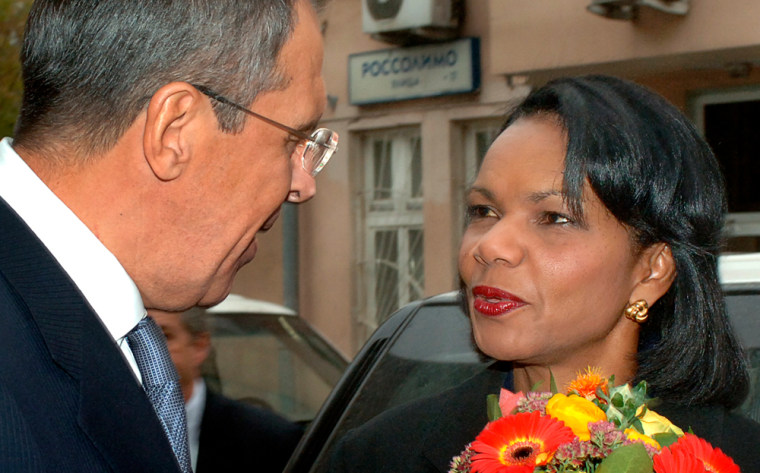U.S. Secretary of State Condoleezza Rice cast doubt on Saturday on reports that North Korea had pledged to stop nuclear tests, saying it seemed bent instead on escalating the crisis.
News reports had raised hopes that tension was easing on Friday by saying North Korean leader Kim Jong-Il had told China’s special envoy Tang Jiaxuan this week that he planned no further nuclear tests.
But Rice met Tang in Beijing on Friday and told reporters traveling on to Moscow with her:
“Tang did not tell me that Kim Jong-Il either apologized for the test or said that he would not ever test again.”
Russia is the last stop on Rice’s five-day trip to shore up support for U.N. economic and weapons sanctions imposed a week ago to punish Pyongyang for conducting an underground nuclear test on October 9.
She played down reports Kim had told Beijing he “regretted” the test, which was condemned internationally, including by China, the North’s closest ally and economic lifeline.
“The Chinese did not, in a fairly thorough briefing to me, say anything about an apology,” she said. “The North Koreans, I think, would like to see an escalation of the tension.”
She also questioned whether Pyongyang intended to return to six-party talks, which have been stalled for nearly a year.
Kim Kye-Gwan, North Korea’s top nuclear negotiator, earlier told U.S. television Pyongyang hoped to return to the table.
No cooperation from North Korea
North Korea has boycotted the talks, which bring together the two Koreas, the United States, Japan, Russia and China, because Washington, accusing it of counterfeiting money, is imposing restrictions on its external financing.
South Korea’s Chosun Ilbo newspaper quoted an unidentified diplomatic source in Beijing as saying Kim had told Tang that Pyongyang would resume talks if Washington ended its financial sanctions. But Rice said they would remain.
“The financial measures are a legal process which has to do with counterfeiting money. The (U.S.) president has made very clear at every turn that he is going to defend the U.S. currency,” she said.
China’s Xinhua news agency quoted Tang as saying the United States should take a more flexible attitude when dealing with North Korea, a view which Russia echoed on Saturday.
“Settling financial problems in relations between the United States and North Korea would have considerable importance in creating conditions for the resumption of the talks,” Russia’s Interfax news agency quoted Foreign Minister Sergei Lavrov as telling the Kuwaiti news agency in an interview.
Lavrov, who said the problem should not be linked to the talks and must remain outside them, added:
“It would be irresponsible to insist on a principle here. Both sides need to be flexible.”
Rice’s visits to Tokyo, Seoul and Beijing were overshadowed by speculation that North Korea would conduct a second nuclear test. But on Friday reports said Kim had told Tang no more nuclear tests were planned.
South Korea’s Yonhap news agency quoted a diplomatic source as saying: “I understand he (Kim) expressed clearly there was no plan to conduct nuclear tests.”
Rice won few commitments from China and South Korea on implementing sanctions on their impoverished neighbor.
China has greatest influence
China is seen as having the greatest potential leverage but fears instability and a potential wave of refugees should sanctions prompt North Korea’s collapse.
Rice said she did not expect a “180-degree turn” in China’s dealings with Pyongyang but added:
“They are still trying to use the relationship to bring about more responsible behavior (from North Korea).”
China is opposed to North Korean ships being checked on the high seas, one measure authorized by the U.N. resolution, believing it could provoke Pyongyang into stronger action.
The Japanese daily Asahi Shimbun said on Saturday China had begun restricting some of its exports to North Korea, including oil and home appliances.
North Korea said it was ready for any crisis and would ”react to the aggressors’ play with fire with dreadful strike of justice.”
Its official KCNA news agency said on Saturday that U.S. pressure for sanctions, backed by Japan and South Korea, was aimed at suffocating the country.
“This development is pushing the situation to the worst phase of confrontation and the eve of war,” it said. “The army and people ... are fully ready to become human bullets and bombs in defending Korean-style socialism, their dignity and life.”
